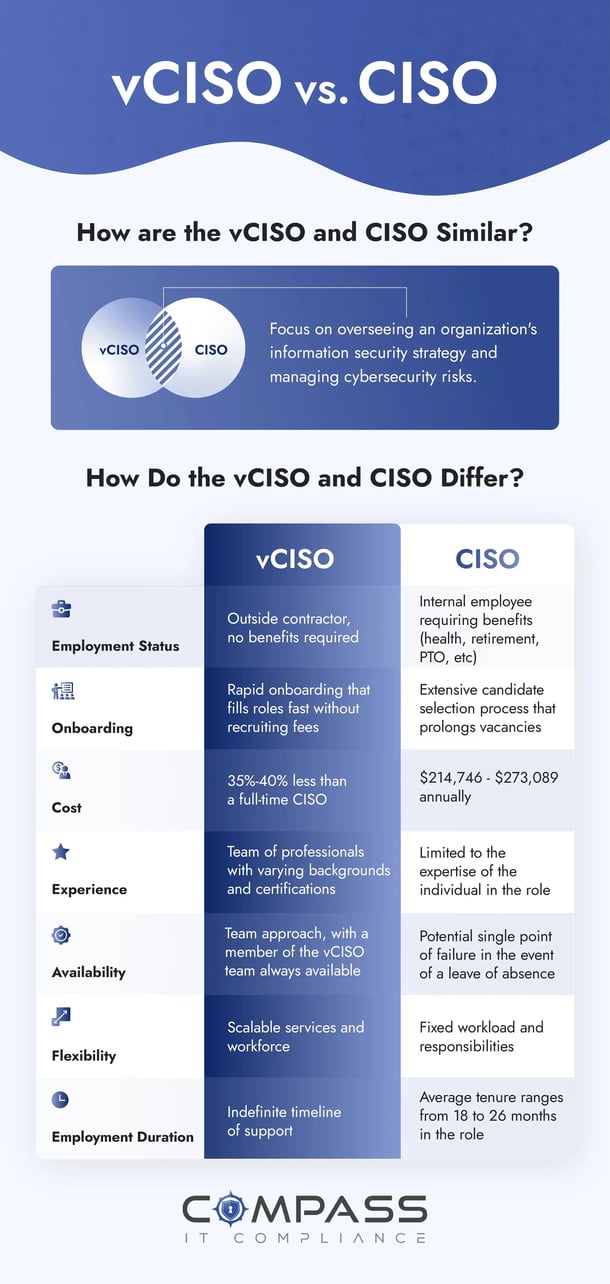vCISO vs. CISO: What's the Difference?
The changing nature of security has resulted in the rise and development of important positions focused on protecting sensitive data. Alongside the role of the Chief Information Security Officer (CISO) a newer role has emerged; the Virtual CISO (vCISO). Although both roles aim to improve security they differ in their methods and contributions. The CISO typically offers an in-house, continuous presence, deeply integrated within the company's infrastructure, ensuring consistent and immediate attention to security matters. In contrast, the vCISO provides a more flexible, often external perspective, offering strategic guidance and expertise tailored to specific needs, especially beneficial for organizations that may not require or cannot support a full-time security executive. This distinction in roles reflects the diverse needs and strategies of businesses in today's complex cybersecurity landscape.
What is a Virtual CISO (vCISO)?
You might be here looking for the answer to the question, "What does vCISO stand for?" The abbreviation vCISO stands for "Virtual Chief Information Security Officer," a key role in the modern, tech-driven business arena. What does a vCISO do? They are in charge of managing and directing an organization's information security strategy, but they do it remotely or under a contract. This role is pretty diverse, as vCISOs work with various companies, encountering different types of security issues. It is a perfect fit for organizations that either cannot afford or do not need a full-time security boss but still want expert help to navigate the complex world of cybersecurity. In these situations, a vCISO offers tailor-made strategies and solutions, crucial for protecting a company's digital assets and establishing a strong, adaptable security infrastructure.
How Does a vCISO Differ From a CISO?
The importance of robust security measures in organizations cannot be overstated. At the forefront of this critical arena are two pivotal roles: vCISO vs. CISO. These positions, while sharing a common goal of safeguarding information, differ significantly in their approach and execution. Understanding the nuances of these roles is essential in appreciating how they bolster an organization's security framework.
Exploring the Role of the Chief Information Security Officer (CISO)
Traditionally, the Chief Information Security Officer (CISO) has played a role as a high-ranking executive in a company with their main focus being the enhancement of the organization’s security measures on a full-time basis. Their primary responsibility involves developing and implementing tailored security strategies that align with the needs of the business. The CISO holds a position in overseeing internal security teams, performing risk assessments, and ensuring compliance with industry standards and regulations. This role is vital for integrating security efforts into the overall objectives of the company. In the United States, as per PayScale data from 2024, the average annual CISO salary is approximately $174,127. For professionals considering how this translates on an hourly basis, a salary-to-hourly calculator can provide a clearer understanding of the role’s financial scope. This figure provides some insight into the financial value associated with this role within corporate structures, highlighting its significance and demanding expertise level.
The Emergence of the Virtual CISO (vCISO): Providing Flexible Expertise
On the flip side, Virtual CISOs (vCISOs) offer an alternative yet valuable approach to organizational security. Typically engaged on a contractual or consultancy basis, vCISOs serve as an ideal solution for organizations that may not require or have resources for a full time CISO, including those seeking specialized services such as Node.js consultancy. Their responsibilities encompass evaluating the existing security landscape, devising customized security strategies, and providing expert recommendations to fortify an organization's defense mechanisms. The true worth of a vCISO stems from their extensive background, gained through collaborating with diverse organizations. This enables them to possess a broad and nuanced comprehension of security obstacles. The vCISO salary is diverse, just like the responsibilities they undertake. Their compensation is influenced by various factors such as the size of the company, the duration of the contract and the specific needs they fulfill. Unlike the fixed compensation structure seen with traditional CISOs, a vCISO's salary is often flexible and adapts to reflect their dynamic and tailored services. With that being said, the expense of a vCISO is typically a fraction of the total cost incurred by hiring a full-time CISO.

Can I Switch From a vCISO to a Traditional CISO?
Thinking about switching from a vCISO to a traditional in-house CISO? It is a path many businesses mull over, particularly when they are hitting growth spurts or their needs start shifting. This kind of change usually signals a business's craving for a cybersecurity approach that is more woven into the daily fabric of operations. Deciding to go with a traditional CISO is no small decision – it shows you are gearing up to bring on board someone who will do more than just manage your cybersecurity from a remote perspective. This person will be working at the heart of your operations (possibly with a daily physical presence at your headquarters), tweaking and adapting your security game plan as needed, with a finger always on the pulse of your company's cyber health. It is a significant step, indicating a commitment to elevating your cybersecurity to the next level.
But here is a twist: hiring a full-time CISO does not have to mean you are saying goodbye to your vCISO. It is pretty common in the business world to blend the strengths of both. Your vCISO can continue to be a valuable asset, especially in specialized areas like managing security questionnaires or updating IT policies and procedures. This dual approach can really supercharge your cybersecurity efforts. You get the best of both worlds – the hands-on, day-to-day leadership from your in-house CISO, along with the broad, seasoned insights of your vCISO. It is a strategic, savvy move that can seriously fortify your cybersecurity infrastructure.
When to Choose vCISO vs CISO
Deciding between hiring a traditional CISO vs. vCISO is a critical decision for any organization prioritizing its cybersecurity. The choice hinges on various factors, each demanding careful consideration.
Firstly, consider the scale and nature of your business. For larger organizations with complex structures, a traditional CISO might be indispensable. Their full-time presence ensures constant, hands-on involvement in the company's day-to-day security needs. When it comes to handling emergencies, building teams, and fitting into the company culture, a traditional CISO is highly valuable for larger companies or those dealing with sensitive data. However, if your organization is smaller or has limited resources, opting for a vCISO might be more practical. Startups and mid-sized businesses often find the flexibility and cost effectiveness of a vCISO appealing. With their diverse experience gained from working with multiple companies, a vCISO can offer valuable insights to businesses that are still shaping their security practices.
Considering budget constraints is also crucial. Hiring a full time CISO involves significant financial investment, including salary, benefits, and other associated costs. On the other hand, a vCISO can provide more budget friendly options through flexible pricing models like hourly rates or project-based fees.
Additionally, it is important to evaluate your cybersecurity needs. If your organization faces dynamic and evolving threats or operates in heavily regulated industries, having continuous oversight from a traditional CISO may prove necessary. In contrast, for companies with more predictable security needs or those looking to augment their existing security strategies without the overhead of a full-time executive, a vCISO could be the ideal solution.
Lastly, think about the long-term strategic goals of your company. A traditional CISO might be better suited for organizations looking to build a long-term, in-house cybersecurity culture. They can drive forward a consistent security strategy aligned with the company’s overall vision. Meanwhile, the benefits of a vCISO can be perfect for companies seeking specialized guidance for short-term projects or to address specific issues without the commitment of a full-time executive.
To summarize, the decision between a traditional CISO and a vCISO should be based on your company’s size, budget, nature of the cybersecurity challenges, and long-term strategic goals. Each option has its unique strengths and caters to different organizational needs, making it crucial to weigh these factors carefully to choose the best fit for your company's security requirements.
How to Choose the Right vCISO
Finding the perfect Virtual Chief Information Security Officer (vCISO) for your company goes beyond simply checking off a list. It is about discovering someone who truly understands your business and its security requirements. Begin by delving into the specific cybersecurity obstacles you face and determining what your business genuinely requires. Then, keep your eyes peeled for a vCISO who has not only walked in shoes similar to yours (think industry experience and a knack for tackling the kind of problems you face) but also has the tech smarts and strategic nous to match. They need to be good with words too — able to chat just as easily with your tech team as with people who might not know their firewall from their Wi-Fi.
It is also crucial to consider their flexibility and adaptability in tailoring their services to meet your specific requirements. Equally important is their ability to seamlessly integrate with your current team, like a puzzle piece that perfectly fits. Once you have narrowed down your options, pay attention to how well they grasp the future trajectory of your business. It is essential to find a firm who not only focuses on resolving immediate issues but also keeps an eye on the long term, guiding your cybersecurity plans in the right direction for years to come.
And that's where Compass IT Compliance comes into the picture. Known for our tailored vCISO solutions, we are the go-to for businesses searching for top-tier guidance and solid security strategies. Working with us means joining forces with pros who know the ins and outs of keeping your data and IT infrastructure secure. Looking for more information? We are all ears and ready to discuss the cybersecurity challenges your business is up against. Contact us today!
Contact Us
Share this
You May Also Like
These Related Stories
.jpg)
What to Look for When Hiring a Virtual CISO (vCISO)

Why the ‘CISO’ in Virtual CISO Services Shouldn’t Scare You

.webp?width=2169&height=526&name=Compass%20white%20blue%20transparent%202%20website%20(1).webp)
-1.webp?width=2169&height=620&name=Compass%20regular%20transparent%20website%20smaller%20(1)-1.webp)
.webp?width=610&height=362&name=March%202024%20CTA%20(6).webp)
No Comments Yet
Let us know what you think